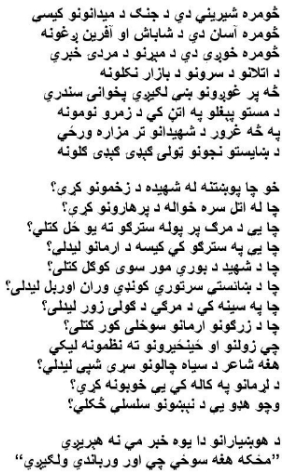

Pride
Abdul Bari Jahani is one of the most famous contemporary poets from Afghanistan writing in Pashto, and it was a real pleasure to be introduced to his work thanks to our translator, the award-winning BBC journalist, Dawood Azami.
This powerful poem directly addresses the fake propaganda promulgated about the glories of war, cleverly puncturing its grandiosity by focussing on the real effects of conflict in the poem’s second stanza. The poem’s apparent simplicity is belied by the urgency of its message.
The poem’s first line sounds as though it will be a conventional – and clichéd – celebration of conflict. You’ll see that in the first two lines we’ve removed the verb ‘are’ that occurs in the Pashto and in Dawood’s literal translation; this has the effect of making these lines sound archaic – rather like Shakespearian English – which signals that the opening of the poem is speaking in clichés. We also switched ‘pleasant’ (line 1 in Dawood’s literal) with ‘sweet’ (in line 3); the words are the same in Pashto but whereas ‘pleasant’ sounds rather bland in English, the notion of the tales of battlefields being ‘sweet’ ramps up the irony. And, in line 3, ‘pleasing’ is again more archaic than ‘pleasant’.
Line 6 in Dawood’s translation uses the term ‘lion-hearts’ which, for English readers, suggests the exploits of the English king, Richard I ‘the Lion Heart’. Dawood explained that ‘the word the poet used is lion/s while referring to brave men. I translated it as lion-heart as the word lion in Pashto means a brave man. There is another word sher dil which means lion-heart (sher means lion in Pashto, Urdu and Persian) and dil means heart in all these languages. It is used as a noun (name of a man) and as an adjective. But I am not sure if the word lion-heart has travelled from England or it existed before that. I suspect it has been there for a long time as lion has always been seen as a symbol of bravery and courage.’ In this line we changed Dawood’s ‘young girls’ to ‘maidens’, again because it sounds so old-fashioned (the word used in Pashto is ‘virgins’ but, of course, this isn’t gender-specific in English).
The second stanza of the poem completely upturns the clichés of the first, immediately demanding we confront the real horrors of war such as the wounds and suffering of those killed in battle. The poet’s anger and frustration is made plain by the imagery he uses – such as the haunting idea of looking into the hero’s eyes at the moment of death to see his ‘thwarted hopes’. What really angers Jabari, though, is that the poets who churn out these clichéd paeans to war have no experience whatever of the bitter experience of conflict – despite the fact they write about ‘chains and shackles’ they’ve never been in a dungeon, let alone thrown into a pit full of scorpions!
As you’ll see, we left the final, powerfully enigmatic, line of Dawood’s translation unaltered: ‘The fire burns the land on which it ignites’.
Sarah Maguire, Workshop Facilitator
